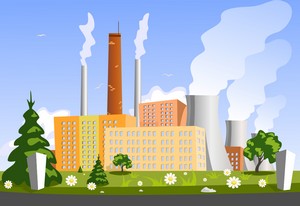Forklift Emissions
Forklift Emissions

With research into green energy and climate change at an all-time high, the impact our actions have on the environment are clearer than ever before. As our generation makes the natural shift towards replacing existing processes with lower impact alternatives, it makes sense that we can see the same shift happening in the material handling industry – more specifically, when we look at forklift emissions.
No matter what kind of fuel type your forklifts run on, at various points during their lifetime they will be producing emissions that affect the environment – whether that’s the initial fuel being burned to generate electricity to run your forklift, or whether it’s the forklift exhaust itself producing emissions when burning the fuel it uses to run.
But what alternatives are out there to reduce the impact our forklifts have on our environment, and how widely adopted are these lower emissions forklifts at this moment in time?
The Toyota Hybrid Lift Truck
Perhaps one of the most recent examples of lower emissions forklifts that are used today, is the recently launched hybrid forklift by Toyota.
Revealed in Japan in 2009, the company’s Geneo Hybrid was the world’s first internal combustion hybrid forklift, and combines internal combustion with electrical powering to take advantage of each power source’s strengths. By shifting automatically between battery and engine modes – simultaneously charging the battery in the process – this hybrid forklift results in approximately half the emissions and double the fuel efficiency.
Many companies looking to improve fuel efficiency and decrease emissions opt for electric vehicles, however these come with their own problems – time-consuming battery changing and battery charging requirements can affect the vehicle’s uptime and productivity; but the hybrid’s self-charging mechanism solves this problem while still reducing emissions and improving fuel efficiency.
This kind of technology is already common in other types of vehicles, so we’re pleased to see that it is coming to the forklift market too. But what about the future – surely a solution exists that will further reduce the impact forklifts have on our environment?
Hydrogen Fuel Cell Forklifts – The Future of Lower Emissions Forklifts?
The Geneo Hybrid might have been the first internal combustion hybrid forklift, but it certainly doesn’t spell the end of the line for a range of futuristic forklifts designed to cut emissions and maximize fuel efficiency – in fact, Toyota is also working on a brand new line of energy-efficient lower emissions forklifts, and recently completed their prototype of the FCHV-F – a Hydrogen Fuel Cell Forklift. Using Hydrogen as its main power source, this model produces electricity without combustion, and generates what Toyota claims is zero carbon dioxide emissions – a true breakthrough in forklift emissions technology.
But will this hydrogen fuel cell forklift catch on? It seems that the clear answer is that it is already catching on – in fact, Kansai International Airport announced earlier this year that it will begin replacing its fleet of forklifts with Toyota’s new Hydrogen Fuel Cell models as part of its efforts to reduce carbon dioxide emissions (Source: http://ajw.asahi.com/article/sci_tech/environment/AJ201502120045). The model can lift loads of up to 2.5 tons, and operates for up to eight hours on a single hydrogen charge. What’s more, the refueling process takes only three minutes!
So why aren’t all companies that use forklifts jumping at the chance to seize these new hydrogen-powered zero-carbon dioxide models?
The Problem with Lower Emissions Forklifts
These modern energy-efficient models might pass forklift emissions testing with flying colors, they might reduce long-term fuel costs, and they might look great for your company’s public relations in terms of emissions reductions. But there’s a huge problem that will stop them becoming the ‘norm’ anytime soon – the cost of ownership.
To get your hands on your own brand new model of hydrogen fuel cell forklift developed by Toyota Industries Corp., you will be looking to pay around $84,000. Many small and medium sized companies struggle to afford a standard fleet of forklifts at the best of times – but this new lower emissions model by Toyota is approximately three times more expensive than a conventional model.
So is the price of lower emissions worth it? Of course it is worth it – if you can afford it. After all, anything we can do to preserve our environment is a good thing. But we believe that unless the cost of ownership suddenly falls within the range of most budgets, then it’s not something we’re going to see catching on for most businesses for many years to come.
Still, if you’re looking to see if there are any forklift models that are more energy efficient and that emit lower emissions than your existing fleet, then you can compare specs and prices using our Quote tool today.
